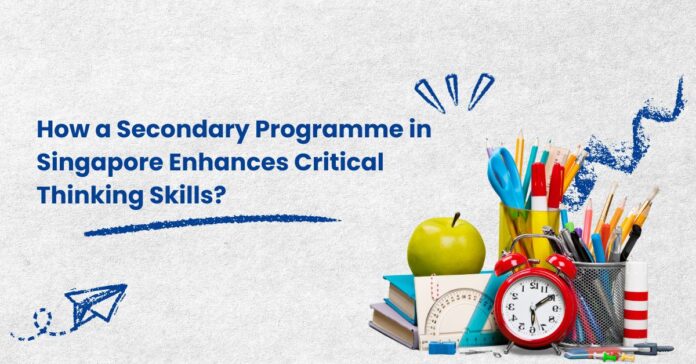Critical thinking is a vital skill that helps students analyze, evaluate, and solve problems effectively. In Singapore, secondary education is designed to cultivate this skill through structured learning experiences and innovative teaching methods. Many parents seek the best tuition centre to further support their child’s critical thinking development. A well-rounded secondary programme plays a key role in building essential problem-solving skills and preparing students for future success.
Encouraging Analytical Thinking
Secondary programmes in Singapore emphasize analytical thinking by introducing complex concepts across various subjects.
- Students learn to break down problems into smaller parts.
- They explore multiple perspectives before forming conclusions.
- Classroom discussions encourage questioning and deeper analysis.
By engaging in this process, students learn to assess information critically and avoid surface-level understanding.
Promoting Inquiry-Based Learning
Inquiry-based learning is a teaching strategy commonly used in Singapore’s secondary schools. This method encourages students to ask questions, investigate topics, and derive answers independently.
- Teachers guide students to explore topics rather than providing direct answers.
- Group projects foster collaboration and sharing of ideas.
- Hands-on experiments in subjects like Science enhance curiosity and critical thinking.
This approach empowers students to think independently and develop a mindset focused on exploration and discovery.
Emphasizing Problem-Solving Skills
Problem-solving is at the core of critical thinking. Singapore’s secondary programme incorporates real-world scenarios to teach these skills effectively.
- Mathematics lessons often include challenging problem sums.
- Humanities subjects explore case studies and global issues.
- Debate clubs and competitions refine logical reasoning.
By facing these challenges, students build resilience and the ability to tackle complex problems with confidence.
Encouraging Open Discussions
Open classroom discussions are a key strategy used to promote critical thinking. Teachers create a safe space where students can share ideas freely without judgment.
- Students learn to articulate their thoughts clearly.
- Constructive feedback encourages improvement.
- Exposure to diverse viewpoints broadens understanding.
Such open dialogues help students evaluate arguments, challenge assumptions, and defend their viewpoints effectively.
Developing Reflection and Self-Assessment
Reflection and self-assessment are integral to the secondary curriculum in Singapore. Students are often encouraged to review their work and identify areas for improvement.
- Journals and reflection sheets are used for personal evaluation.
- Peer assessments help students give and receive constructive feedback.
- Goal-setting exercises promote personal growth and accountability.
This practice encourages self-awareness and continuous improvement in decision-making processes.
Incorporating Interdisciplinary Learning
Interdisciplinary learning connects multiple subjects, helping students see the bigger picture and think critically across fields.
- History lessons linked with literature deepen cultural understanding.
- Mathematics applied in science experiments enhances practical knowledge.
- Art projects integrated with technology foster creative problem-solving.
This method teaches students to apply critical thinking across various contexts, enhancing their cognitive flexibility.
Encouraging Collaboration and Teamwork
Collaboration plays a significant role in developing critical thinking skills. Singapore’s secondary schools emphasize teamwork through group activities and projects.
- Group assignments require shared decision-making and planning.
- Peer learning activities help students learn from each other’s strengths.
- Team-building exercises strengthen communication skills.
Working together allows students to explore diverse viewpoints and improve their ability to think critically in collaborative settings.
How the Best Tuition Centre Supports Critical Thinking
The best tuition centre complements secondary school education by offering personalized learning experiences.
- Small class sizes allow for individual attention.
- Tutors use advanced questioning techniques to promote deeper thinking.
- Customised materials challenge students beyond the standard curriculum.
By focusing on critical thinking strategies, these centres help students excel in both academics and life skills.
Conclusion
A well-designed secondary programme in Singapore is instrumental in enhancing critical thinking skills. Through inquiry-based learning, open discussions, and interdisciplinary approaches, students develop the ability to think analytically and solve complex problems. Choosing the best tuition centre can further support this journey by providing additional guidance and personalized learning experiences. Ultimately, fostering critical thinking skills prepares students for lifelong success in academics and beyond.

